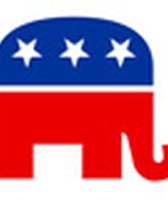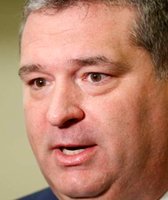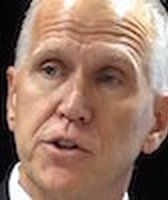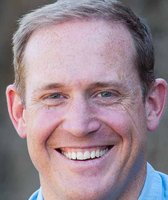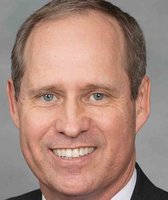Stand up for the facts!
Our only agenda is to publish the truth so you can be an informed participant in democracy.
We need your help.
I would like to contribute
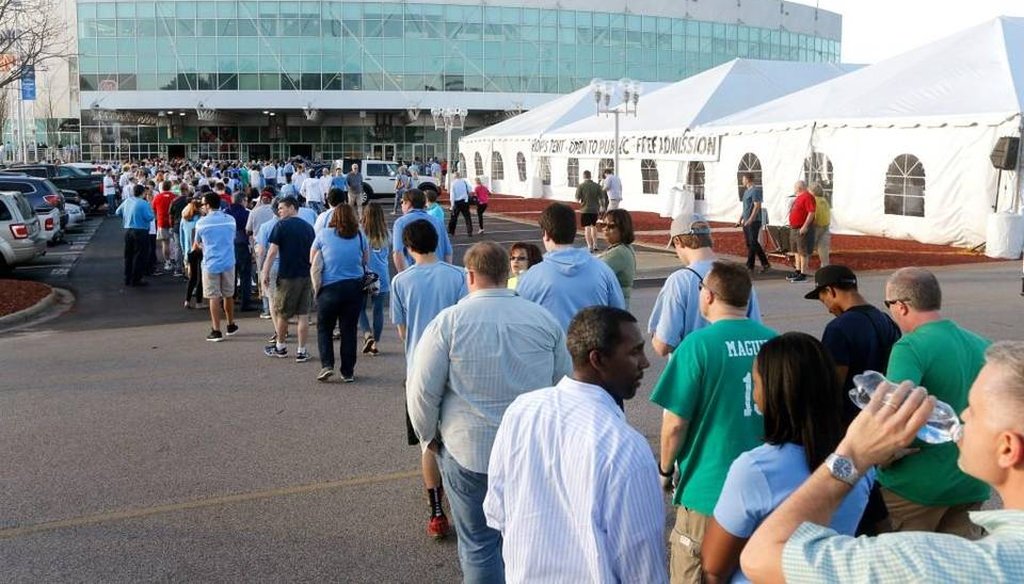
Fans line up outside PNC Arena in Raleigh, N.C. before UNC’s game against Florida Gulf Coast in the first round of the NCAA Division I Men’s Basketball Championship on March 17, 2016. News & Observer photo.
There's a September Sadness in North Carolina over March Madness.
The NCAA announced Monday night would pull its popular basketball tournament out of North Carolina in 2017, in addition to championship matches in 2016 and 2017 for soccer, golf, tennis, lacrosse and baseball. The reason? North Carolina's controversial LGBT law, often called HB2 or the "bathroom bill."
For a refresher on what the state's controversial law, see our previous fact-checks here, here, here, here, here, here and here.
We've also written fact-checks on the power and transparency of the Human Right Council, the pro-LGBT group that has led much of the opposition to North Carolina.
Speculation has already begun on the financial cost to the state. And for the political impact? Another fact-check last month explored the relative popularity of college basketball in North Carolina.
Sign up for PolitiFact texts
Monday's annoucement from the NCAA quickly received attention – positive, from Democratic presidential candidate Hillary Clinton, and negative, from the state's Republican Party.
A common charge from critics has been that other states have the same laws regarding LGBT people that North Carolina does – but that those states aren’t being punished.
PolitiFact previously ruled it Half True that "31 other states and 10,000 other cities" have the same controversial laws as North Carolina does.
But the NCAA said its decision was because the situation in North Carolina "is different from that of other states because of at least four specific factors."
So for those who have not followed this legal saga in North Carolina since March, we looked into the reasons why the NCAA is right: When it comes to laws regarding LGBT people and discrimination, no other state is quite like North Carolina.
Here's a closer look at the four factors the NCAA cited in its decision.
Overturning discrimination protections
"North Carolina laws invalidate any local law that treats sexual orientation as a protected class or has a purpose to prevent discrimination against lesbian, gay, bisexual or transgender individuals," the NCAA wrote.
That is true. Several city governments around North Carolina had rules protecting their own employees or subcontractors from discrimination based on LGBT status. But House Bill 2, passed in March by the legislature and signed by Republican Gov. Pat McCrory, overturned those rules and further prevented any other local government from enacting such rules in the future.
PolitiFact looked into that issue in March, giving a False ruling to McCrory’s claim that "We have not taken away any rights that have currently existed in any city in North Carolina."
North Carolina, however, is not the only state with such a law. Arkansas and Tennessee also ban their cities and counties from having discrimination policies different from the state’s, and those state laws do not protect LGBT people from discrimination.
Bathroom access
"North Carolina has the only statewide law that makes it unlawful to use a restroom different from the gender on one’s birth certificate, regardless of gender identity," the NCAA wrote.
That is true. Most states are silent on this issue, although some have considered – but not yet passed – laws like in North Carolina.
Proponents of North Carolina’s bathroom provision say it’s for safety. PolitiFact found in March that there are no proven instances anywhere in the U.S. of a sexual predator using transgender-friendly bathroom rules to commit crimes, although it did happen once in Canada.
In 2015, Washington became the first and so far only state to do the opposite of North Carolina and specifically allow bathroom access based on gender identity.
Additionally, a number of individual city and county governments around the country have begun enacting laws to allow transgender people to use the bathroom based on the gender with which they identify instead of biological gender.
So Washington is the outlier on one end, and North Carolina is the outlier on the other end. The other 48 states have yet to choose which direction to go, although most of the country’s largest cities are following Washington.
Government can refuse services to LGBT people
"North Carolina law provides legal protections for government officials to refuse services to the LGBT community," the NCAA wrote.
That is true. Although it’s not part of HB2, North Carolina is one of just two states to specifically authorize magistrates to refuse to marry gay and lesbian couples if they have religious objections.
In 2015, the U.S. Supreme Court ruled that same-sex couples could marry. North Carolina’s legislature reacted by passing the law in question. That was against the advice of the director of the state court system, who said magistrates don’t ever perform religious ceremonies on the job – they just preside over civil matrimonies.
Some magistrates in a handful of other states have refused to give marriage licenses to gay couples – most famously Kim Davis in Kentucky – but North Carolina and Utah are the only states to pass a law explicitly giving magistrates that power.
The law is currently being challenged in court; N.C. Attorney General Roy Cooper, McCrory’s Democratic challenger who has refused to defend HB2, is defending the state.
Logistics concerns
"Five states plus numerous cities prohibit travel to North Carolina for public employees and representatives of public institutions, which could include student athletes and campus athletics staff," the NCAA wrote. "These states are New York, Minnesota, Washington, Vermont and Connecticut."
That is true, and North Carolina is unusual in being the subject of a travel ban by other state governments. Mississippi has also been the subject of several state travel bans over its new law related to LGBT rights; however, the state has already been banned from hosting most NCAA postseason play since 2001 due to the use of a Confederate emblem on its state flag.
The ban means that public universities from those states – including notable sports schools like UConn, Washington, Washington State, Minnesota and Stony Brook – couldn’t have sent their teams to North Carolina if they were to have made it to one of the now-relocated postseason events.
Already, some teams have had to cancel regular-season games in North Carolina due to the travel bans – including Albany’s men’s basketball game against Duke and the University of Vermont’s women’s basketball game against UNC.
Our Sources
See all fact-checks at politifact.com/north-carolina









